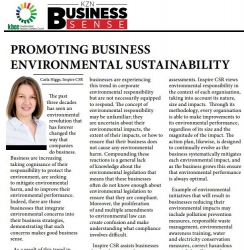Carla Higgs - Promoting Business Environmental Sustainability2016-04-29 The past three decades has seen an environmental revolution that has forever changed the way that companies do business. Business are increasing taking cognisance of their responsibility to protect the environment, are seeking to mitigate environmental harm, and to improve their environmental performance. Indeed, there are those businesses that integrate environmental concerns into their business strategies, demonstrating that such concerns makes good business sense.
As a result of this trend in environmentally responsible business practices, it has become common practice for JSE listed and multinational companies to set environmental requirements for smaller businesses in their supply and value chains. They require that these businesses reach certain environmental performance standards in order to retain their custom. This means that businesses in their supply chains are inspected periodically to ensure that the specified environmental standards are met. Even the smallest businesses in the supply chain are required to improve their environmental performance. Many businesses that supply or contract to these larger businesses are experiencing this trend in corporate environmental responsibility but are not necessarily equipped to respond. The concept of environmental responsibility may be unfamiliar; they are uncertain about their environmental impacts, the extent of their impacts, or how to ensure that their business does not cause any environmental harm. Compounding these reactions is a general lack of knowledge about the environmental legislation that means that these businesses often do not know enough about environmental legislation to ensure that they are compliant. Moreover, the proliferation of and multiple amendments to environmental law can create confusion and make understanding what compliance involves difficult. Inspire CSR assists businesses that need to respond to this trend and incorporate environmentally responsibility. Each business is assisted to identify the environmental legislation that is applicable to their situation and to identify their environmental impacts. Once identified, each impact is prioritised and is assessed as a potential source of business risk and opportunity. An action plan is then formulated to ensure that environmental compliance and reductions in environmental impacts are achieved. As the effects of different businesses and business sectors upon the environment vary enormously; the size and nature of the business is an important consideration when conducting assessments. Inspire CSR views environmental responsibility in the context of each organisation, taking into account its nature, size and impacts. Through its methodology, every organisation is able to make improvements to its environmental performance, regardless of its size and the magnitude of the impact. The action plan, likewise, is designed to continually evolve as the business systematically mitigates each environmental impact, and as the business grows this ensure that environmental performance is always optimal. Example of environmental initiatives that will result in businesses reducing their environmental impacts may include pollution prevention measures, responsible waste management, environmental awareness training, water and electricity conservation measures, correct hazardous materials handling, and greenhouse gas emissions quantification and management. Businesses that adopt this approach may realise worthwhile benefits. Self-evident benefits include improved environmental performance, environmental legal compliance, improved environmental skills and knowledge within the business and the satisfaction of customer (supply chain) requirements. Business can also expect to attain reputational benefits and energy and material efficiencies. Carla Higgs Cell: 083 395 0080 Fax: 086 534 1765 carla@inspirecsr.co.za www.inspirecsr.co.za |
Carla Higgs - Promoting Business Environmental Sustainability
Copyright © 2026 KwaZulu-Natal Top Business
